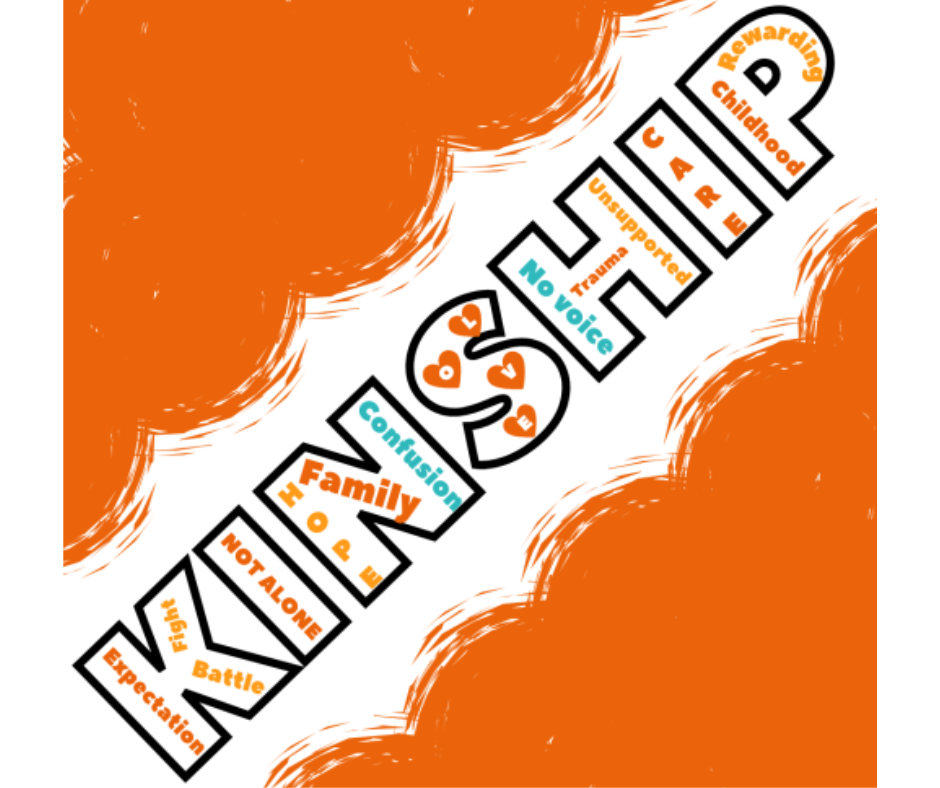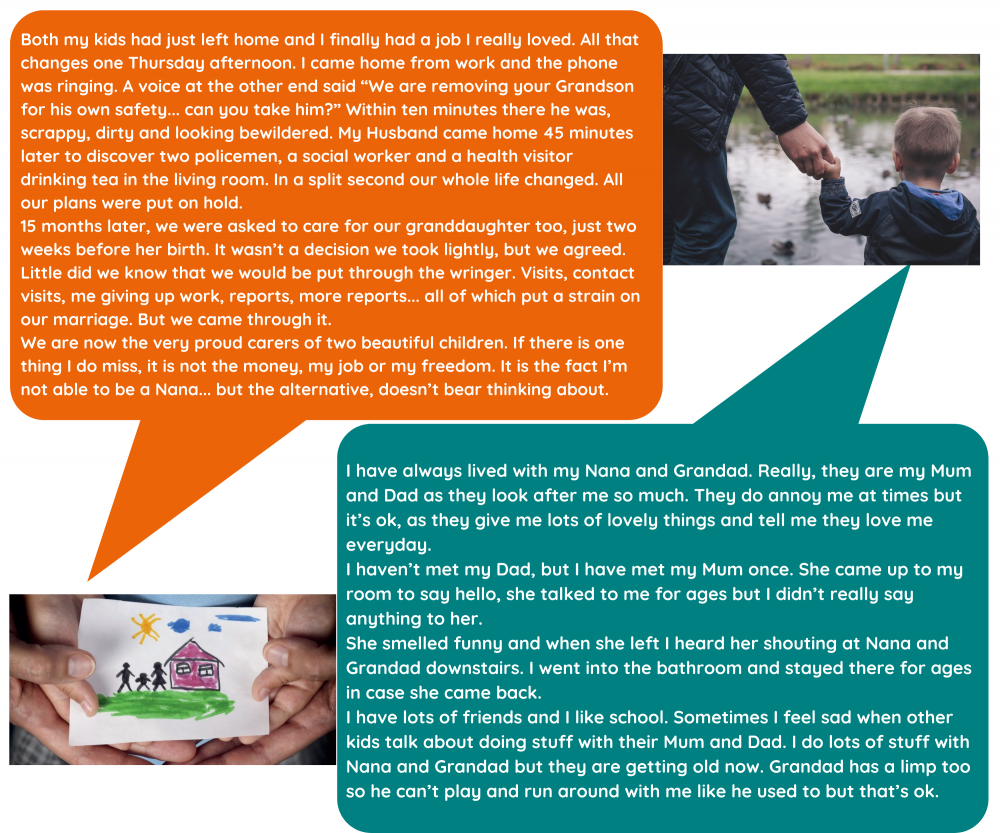
What is a Kinship Carer?
Kinship carers are family or friends that step in to care for a child when their parents aren't able to. This may be because a parent has died, is unwell, has gone to prison, has problems with drugs and alcohol, or neglects or abuses their child. Kinship care often happens after a crisis situation.
Kinship carers are usually grandparents, aunts, uncles, brothers, sisters, stepparents, stepbrothers, stepsisters, or close family friends who knows the child well.
Care may last for a short period of time or become a permanent arrangement.
Children and young people in kinship care are known as kinship kids. Almost half of kinship kids have a disability or emotional difficulty.
Types of Kinship Care
There are many different types of kinship care, including:
- Informal Kinship Care: When a child is looked after by a close relative, such as a grandparent, brother, sister, uncle, aunt or step-parent. The child’s parents will usually discuss and agree with the kinship carer how the arrangement will work. The local authority has no major involvement in the arrangement and there is no court order in place.
- Formal Kinship Care: Involves the local authority or the courts and can include Kinship Foster Care, a Child Arrangement Order, or a Special Guardianship Order.
As your situation changes over time, you may become a different type of kinship carer. Your rights, responsibilities and the type of support you can access will depend on your specific circumstances.
For more information about the different type of kinship care visit https://kinship.org.uk/advice-topic/types-of-kinship-care/
Kinship carers often take on the role unexpectedly and may face emotional, practical, or financial challenges. Support and advice are available to help families through these changes.

Where to access support and advice
Redcar & Cleveland Kinship Team
Call 07909 906446 or e-mail kinshipduty@redcar-cleveland.gov.uk
Middlesbrough Kinship Support Service
Call 01642 726 008 or email kinshipsupport@middlesbrough.gov.uk
Or visit the website www.middlesbrough.gov.uk/kinship-carer
You can also contact MACH for early help and kinship carers will be offered support, advice, signposting and information. Kinship carers experience some of the most difficult challenges. MACH sits within the South Tees Safeguarding Children's Partnership.
Middlesbrough Multi-Agency Children's Hub (MACH) or
Redcar & Cleveland Multi-Agency Children's Hub (MACH)
Kinship is the leading kinship care charity in England and Wales. Kinship Compass is there to help all kinship carers to get expert advice and information. And to support them to access emotional support through peer support groups and connecting with other kinship carers.

Local peer support groups
Kinship Peer Support in Middlesbrough
There are kinship peer support groups in Middlesbrough. To find out more call 01642 726 008 or email kinshipsupport@middlesbrough.gov.uk
Kinship Peer Support in Redcar
The group meet monthly on a Friday 10am at 25K Youth & Community Centre, Ayton Drive, Redcar. The group is completely informal and very welcoming, and always has a support worker in attendance. To find out more call 07909 906446 or e-mail kinshipduty@redcar-cleveland.gov.uk
We have pulled together some frequently asked questions by kinship carers that you may find useful.
The realities of kinship care
Kinship carers often face stress, anxiety, and health challenges because of the circumstances that led them to take on this role. Many are over 50 and may already have a caring role like looking after an elderly relative. Adding the responsibility of looking after kinship kids means they juggle a dual caring role.
Financial support for kinship carers differs greatly from that for foster carers. Kinship carers can claim Child Benefit and Child Tax Credits, but many do not receive other financial help, and not all can access additional welfare benefits. This can lead to serious financial hardship, poverty, and housing problems, such as living in a home that becomes too small when kinship kids move in.
Kinship carers also often have limited access to information, advice, or advocacy. They need to know where to turn for help and what support and benefits they may be entitled to (for themselves and the children in their care). As children and young people grow and change, support needs also evolve. MACH helps kinship carers and kinship kids get the right support at the right time, so families can make the most of their time together.
Despite the challenges, many Kinship carers say the rewards are enormous and would make the same choice again.

Other useful contacts
- Adult Social Care Single Point of Access (SPA) Middlesbrough 01642 726004
- Adult Social Care Redcar & Cleveland 01642 065070
- Carers Together (adult carers) 01642 488977
- Department of Works & Pensions (DWP) 0843 5158313
- Emergency Duty Team (EDT) Middlesbrough 08702 402994
- Emergency Duty Team (EDT) Redcar & Cleveland 01642 524552
- Family Information Directory Service- Middlesbrough 01642 354200
- Family Information Service- Redcar & Cleveland 01642 444532
- Kinship Advice Service number 0300 123 7015
- Middlesbrough Early Help
- Middlesbrough Citizens Advice Bureau (CAB) 01642 802282
- Middlesbrough Welfare Rights Line 01642 729242
- Middlesbrough Multi-Agency Children's Hub (MACH) 01642 726004
- Redcar & Cleveland Citizens Advice 01642 030000
- Redcar & Cleveland Council Early Help 01642 130680
- Redcar & Cleveland Council Special Guardianship Order (SGO) Team 07909 906446/ KinshipDuty@redcar-cleveland.gov.uk
- Redcar & Cleveland Multi-Agency Children's Hub (MACH) 01642 130700
- Redcar & Cleveland Special Education Needs & Disabilities Local Offer
- Redcar & Cleveland Council Money Advice Service
- SEND & Vulnerable Learners- Middlesbrough 01642 201831
- South Tees Youth Offending Team 01642 201888
- Staying Put Agency- Middlesbrough 0800 5875184
- The Junction 01642 756000
